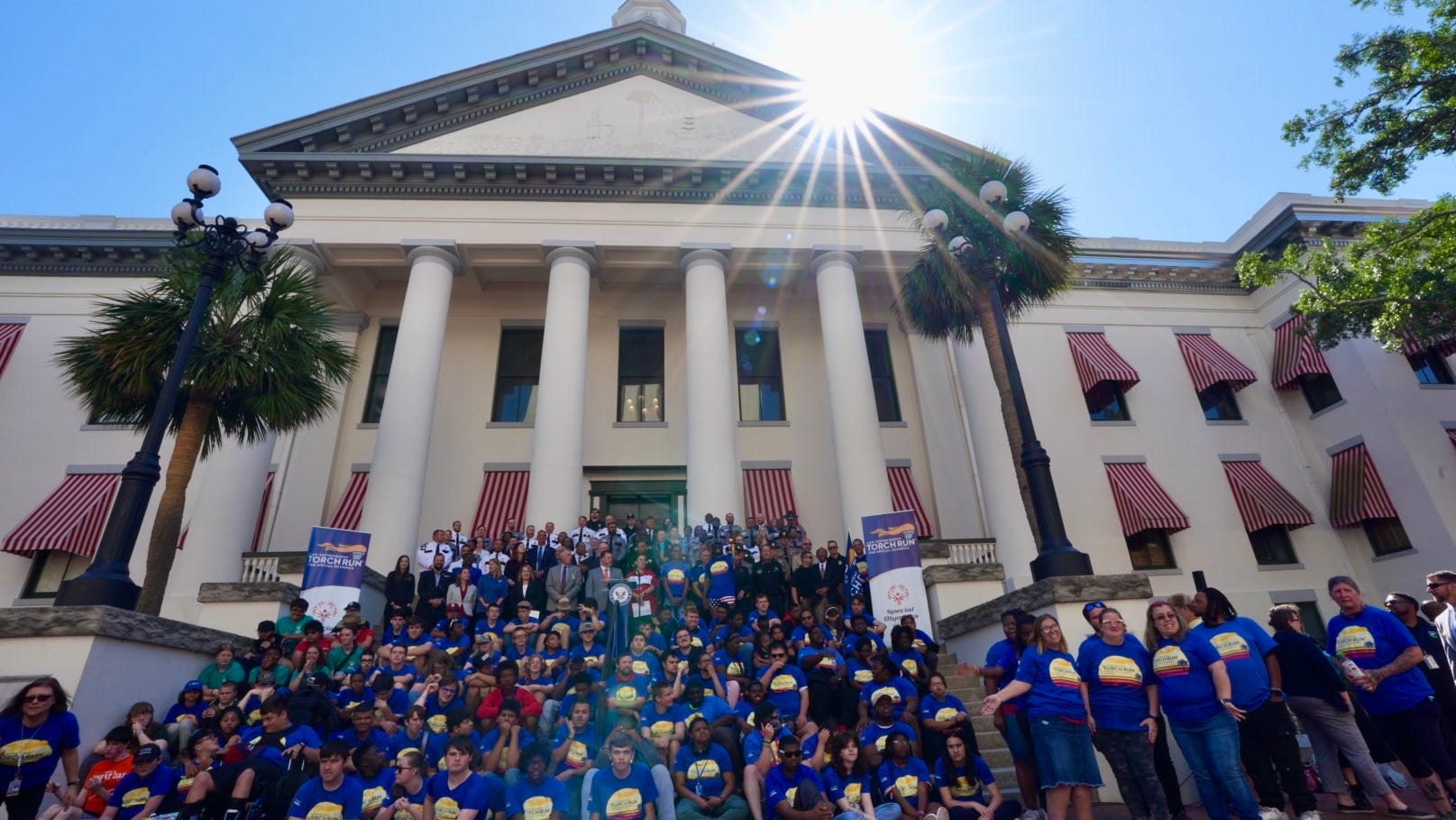House and Senate budget and tax cut negotiators are running out of time to reach a deal and end the legislative session on time.

Local cheerleaders with Special Olympics show their skills at Capitol
Special Olympics athletes demonstrate their cheerleading skills during Annual Law Enforcement Torch Run and ceremony at Capitol courtyard.
- The House and Senate disagree on tax cut plans, with differing approaches and overall amounts.
- The legislative session’s deadline is approaching, with budget and tax cut negotiations still ongoing.
One of Gov. Ron DeSantis’ main gripes with the House in his ongoing feud with that chamber has been the lack of action on cutting property taxes.
On April 22, the House advanced a plan to trim property taxes, but it’s opposed by the tourism industry. A provision in HB 7033, passed by the House Budget Committee, would require county commissions to give a rebate to property owners on their tax bills based on the amount of tourist development taxes (TDTs) collected the prior year.
House leaders believe it will provide relief to property owners faster than DeSantis’ idea of putting a measure on the 2026 ballot.
“We are trying to provide as many options as we can come up with to provide property tax relief prior to the November ‘26 general election ballot,” Rep. Wyman Duggan, R-Jacksonville, sponsor of the bill, told reporters after the bill passed.
DeSantis has harped on the House on a number of issues as the chamber frustrates his agenda – and property tax cuts has been near the top of the list. He has said he’d like to eliminate property taxes entirely, but in lieu of that wants lawmakers to put an amendment on the 2026 ballot to increase the homestead property tax exemption.
Constitutional change needed to ditch property tax
Property taxes are in the state constitution and in general would require a constitutional amendment to significantly cut them, meaning lawmakers’ options to adjust property taxes with a simple bill are limited.
But DeSantis urged them to backfill the state portion of property taxes going to public schools while mandating a $1,000 rebate be given to homestead property owners. That plan, however, hasn’t been included in either chamber’s budget or tax cut plans.
DeSantis in recent days has said the House is “sabotaging” the progress made by Florida and is undermining his agenda.
The House plan faces a tricky road to become law. The Senate’s tax cut plan doesn’t include the TDT provision and will be part of negotiations between the chambers over the final budget.
There’s also the opposition from the influential tourism industry, which also opposes another part of the bill that would eliminate tourist development councils, the groups that administer the TDT revenues.
‘Bed taxes’ restricted to certain uses
Also known as “bed taxes,” TDTs are placed on transient rental stays at hotels, motels, apartments, houses, condos and timeshare resorts. The revenues are restricted by law to go toward specific tourism-related purposes, such as construction and maintenance of arenas, convention centers or other “tourist-related facilities,” and for advertising, promotions and beach renourishment.
But the House plan would allow counties to use that money for any use, while requiring them to give rebates to property owners based on the amount of tourist development taxes they received the prior year.
“Without TDTs, lesser destination candidates have an opportunity to turn voters’ heads, causing them to spend their time and more importantly their dollars elsewhere,” Florida Restaurant and Lodging Association general counsel Samantha Padgett told the panel. “When Florida wins our citizens, our businesses and our communities win.”
The committee, though, rejected an amendment offered by House Democratic Leader Fentrice Driskell of Tampa, that would have removed the TDT provision on a partisan voice vote.
Time running down for legislative session
House and Senate budget and tax cut negotiators are running out of time to reach a deal and end the legislative session on time. The session is slated to end May 2, and the chambers haven’t agreed to top line budget numbers to begin formal negotiations.
The sides are far apart on tax cut plans, with the House plan at nearly $5 billion and the Senate plan at $2.2 billion in overall cuts. The House version is centered on a permanent reduction in the sales tax from 6% to 5.25%, while the Senate version would remove the sales tax completely on clothing items at $75 or less.
Duggan said the House is trying to provide as much tax relief as possible as soon as possible.
“We hear our constituents saying Florida has an affordability problem,” Duggan said. “We have to look at what can we do as a legislature that takes effect July 1, 2025.”
Gray Rohrer is a reporter with the USA TODAY Network-Florida Capital Bureau. He can be reached at grohrer@gannett.com. Follow him on X: @GrayRohrer.



